Human Rights Practice: Gambling Legislation and Court Report
VerifiedAdded on 2023/06/03
|7
|2562
|85
Report
AI Summary
This report examines a court case concerning gambling, focusing on the human rights issues involved and the adequacy of existing legislation. The plaintiff, a gambling addict, sued a casino for losses incurred, arguing exploitation due to his addiction. The court considered arguments around the casino's knowledge of the plaintiff's condition and whether inducements to gamble constituted exploitation. The report evaluates the court's verdict, highlighting the balance between individual responsibility and the protection of vulnerable individuals. It also addresses the role of the courts in interpreting and applying existing laws, emphasizing that legislative changes are the responsibility of Parliament. The analysis draws upon relevant Australian laws on betting and theoretical materials related to gambling addiction and exploitation.
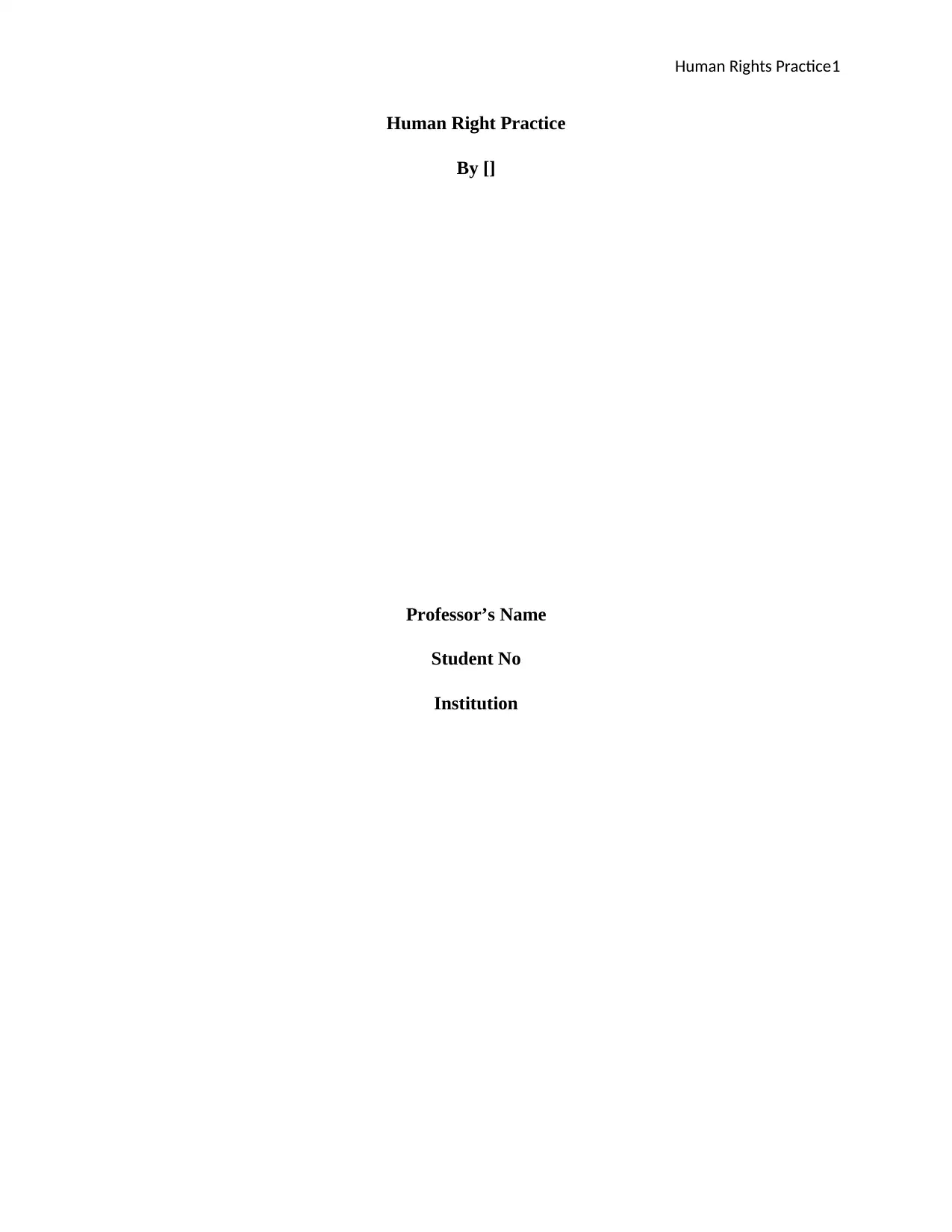
Human Rights Practice1
Human Right Practice
By []
Professor’s Name
Student No
Institution
Human Right Practice
By []
Professor’s Name
Student No
Institution
Paraphrase This Document
Need a fresh take? Get an instant paraphrase of this document with our AI Paraphraser
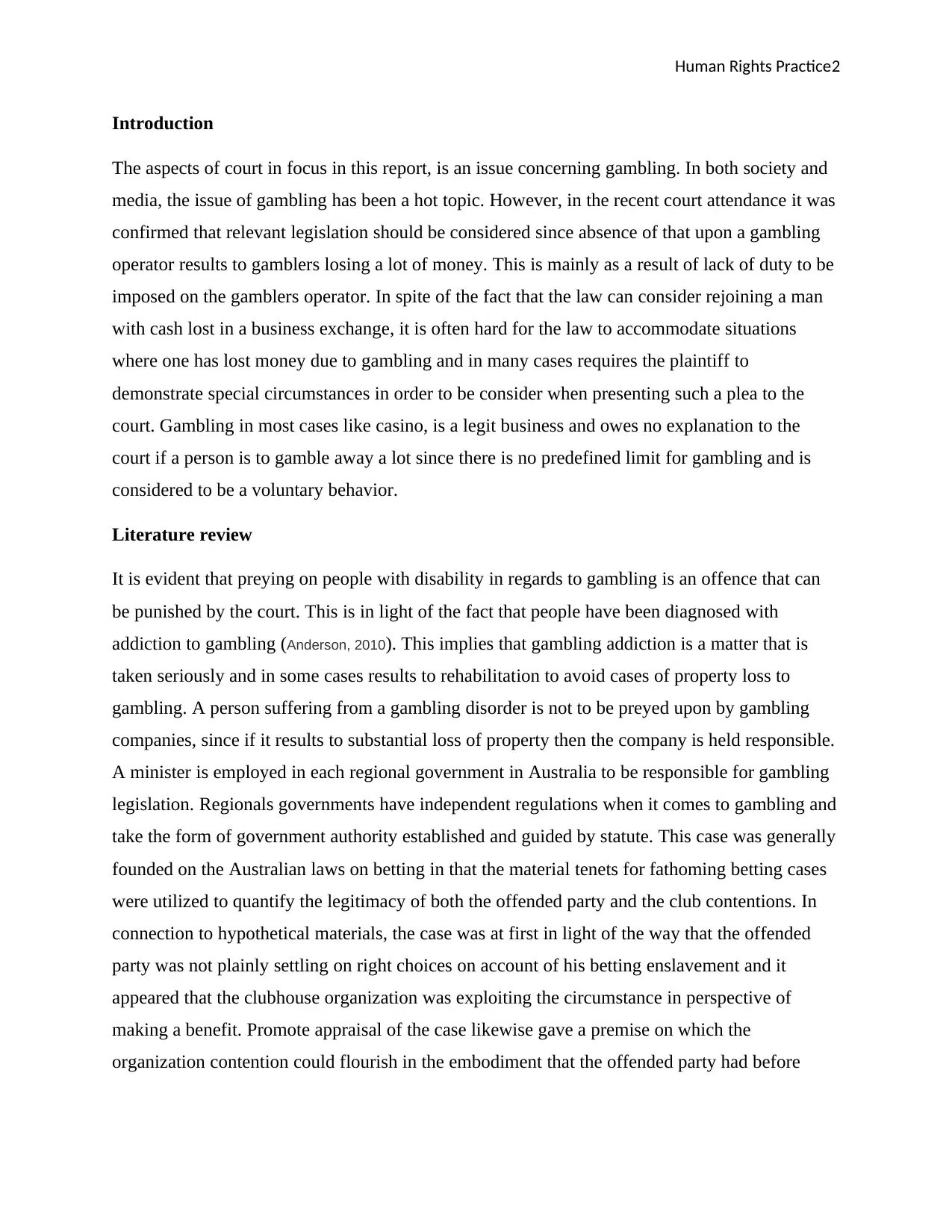
Human Rights Practice2
Introduction
The aspects of court in focus in this report, is an issue concerning gambling. In both society and
media, the issue of gambling has been a hot topic. However, in the recent court attendance it was
confirmed that relevant legislation should be considered since absence of that upon a gambling
operator results to gamblers losing a lot of money. This is mainly as a result of lack of duty to be
imposed on the gamblers operator. In spite of the fact that the law can consider rejoining a man
with cash lost in a business exchange, it is often hard for the law to accommodate situations
where one has lost money due to gambling and in many cases requires the plaintiff to
demonstrate special circumstances in order to be consider when presenting such a plea to the
court. Gambling in most cases like casino, is a legit business and owes no explanation to the
court if a person is to gamble away a lot since there is no predefined limit for gambling and is
considered to be a voluntary behavior.
Literature review
It is evident that preying on people with disability in regards to gambling is an offence that can
be punished by the court. This is in light of the fact that people have been diagnosed with
addiction to gambling (Anderson, 2010). This implies that gambling addiction is a matter that is
taken seriously and in some cases results to rehabilitation to avoid cases of property loss to
gambling. A person suffering from a gambling disorder is not to be preyed upon by gambling
companies, since if it results to substantial loss of property then the company is held responsible.
A minister is employed in each regional government in Australia to be responsible for gambling
legislation. Regionals governments have independent regulations when it comes to gambling and
take the form of government authority established and guided by statute. This case was generally
founded on the Australian laws on betting in that the material tenets for fathoming betting cases
were utilized to quantify the legitimacy of both the offended party and the club contentions. In
connection to hypothetical materials, the case was at first in light of the way that the offended
party was not plainly settling on right choices on account of his betting enslavement and it
appeared that the clubhouse organization was exploiting the circumstance in perspective of
making a benefit. Promote appraisal of the case likewise gave a premise on which the
organization contention could flourish in the embodiment that the offended party had before
Introduction
The aspects of court in focus in this report, is an issue concerning gambling. In both society and
media, the issue of gambling has been a hot topic. However, in the recent court attendance it was
confirmed that relevant legislation should be considered since absence of that upon a gambling
operator results to gamblers losing a lot of money. This is mainly as a result of lack of duty to be
imposed on the gamblers operator. In spite of the fact that the law can consider rejoining a man
with cash lost in a business exchange, it is often hard for the law to accommodate situations
where one has lost money due to gambling and in many cases requires the plaintiff to
demonstrate special circumstances in order to be consider when presenting such a plea to the
court. Gambling in most cases like casino, is a legit business and owes no explanation to the
court if a person is to gamble away a lot since there is no predefined limit for gambling and is
considered to be a voluntary behavior.
Literature review
It is evident that preying on people with disability in regards to gambling is an offence that can
be punished by the court. This is in light of the fact that people have been diagnosed with
addiction to gambling (Anderson, 2010). This implies that gambling addiction is a matter that is
taken seriously and in some cases results to rehabilitation to avoid cases of property loss to
gambling. A person suffering from a gambling disorder is not to be preyed upon by gambling
companies, since if it results to substantial loss of property then the company is held responsible.
A minister is employed in each regional government in Australia to be responsible for gambling
legislation. Regionals governments have independent regulations when it comes to gambling and
take the form of government authority established and guided by statute. This case was generally
founded on the Australian laws on betting in that the material tenets for fathoming betting cases
were utilized to quantify the legitimacy of both the offended party and the club contentions. In
connection to hypothetical materials, the case was at first in light of the way that the offended
party was not plainly settling on right choices on account of his betting enslavement and it
appeared that the clubhouse organization was exploiting the circumstance in perspective of
making a benefit. Promote appraisal of the case likewise gave a premise on which the
organization contention could flourish in the embodiment that the offended party had before
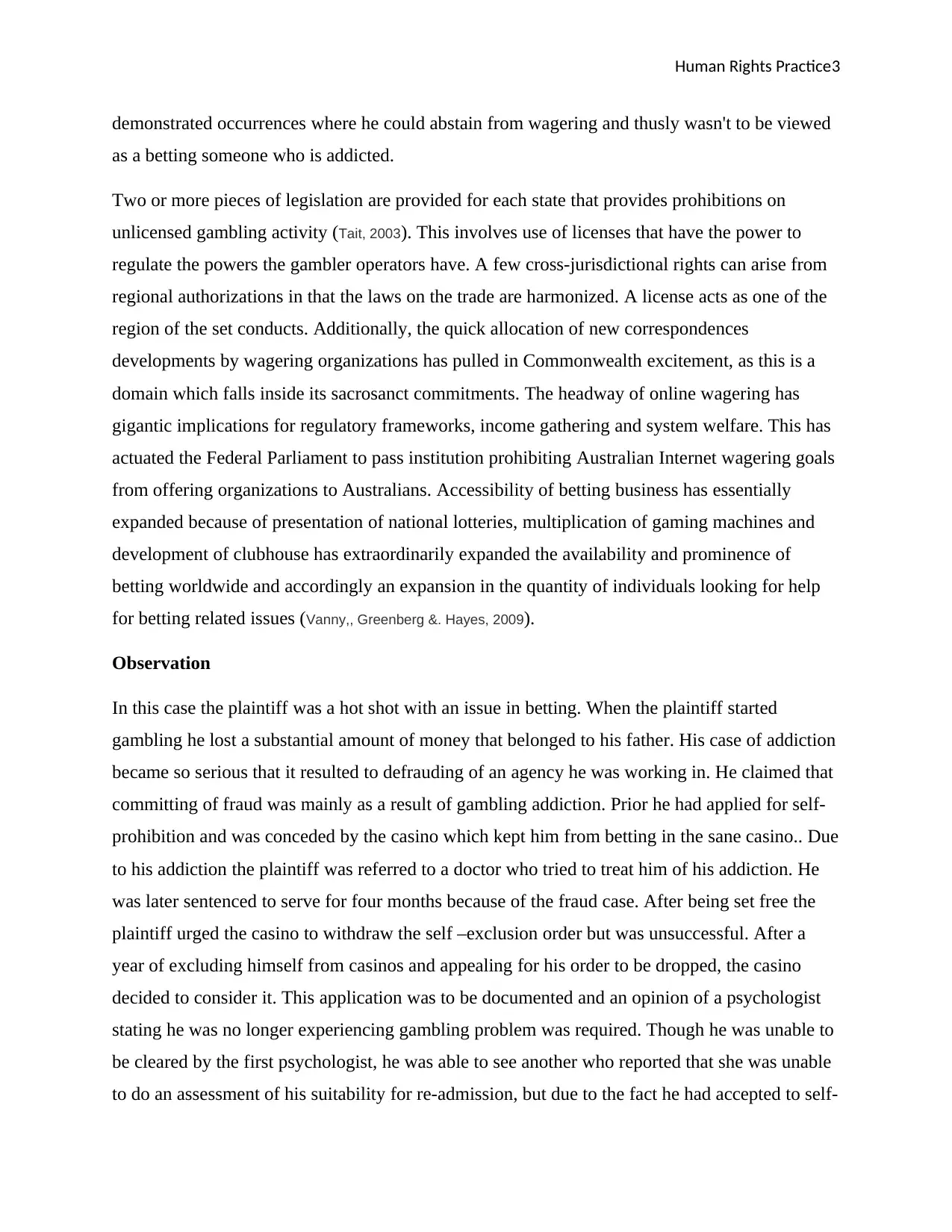
Human Rights Practice3
demonstrated occurrences where he could abstain from wagering and thusly wasn't to be viewed
as a betting someone who is addicted.
Two or more pieces of legislation are provided for each state that provides prohibitions on
unlicensed gambling activity (Tait, 2003). This involves use of licenses that have the power to
regulate the powers the gambler operators have. A few cross-jurisdictional rights can arise from
regional authorizations in that the laws on the trade are harmonized. A license acts as one of the
region of the set conducts. Additionally, the quick allocation of new correspondences
developments by wagering organizations has pulled in Commonwealth excitement, as this is a
domain which falls inside its sacrosanct commitments. The headway of online wagering has
gigantic implications for regulatory frameworks, income gathering and system welfare. This has
actuated the Federal Parliament to pass institution prohibiting Australian Internet wagering goals
from offering organizations to Australians. Accessibility of betting business has essentially
expanded because of presentation of national lotteries, multiplication of gaming machines and
development of clubhouse has extraordinarily expanded the availability and prominence of
betting worldwide and accordingly an expansion in the quantity of individuals looking for help
for betting related issues (Vanny,, Greenberg &. Hayes, 2009).
Observation
In this case the plaintiff was a hot shot with an issue in betting. When the plaintiff started
gambling he lost a substantial amount of money that belonged to his father. His case of addiction
became so serious that it resulted to defrauding of an agency he was working in. He claimed that
committing of fraud was mainly as a result of gambling addiction. Prior he had applied for self-
prohibition and was conceded by the casino which kept him from betting in the sane casino.. Due
to his addiction the plaintiff was referred to a doctor who tried to treat him of his addiction. He
was later sentenced to serve for four months because of the fraud case. After being set free the
plaintiff urged the casino to withdraw the self –exclusion order but was unsuccessful. After a
year of excluding himself from casinos and appealing for his order to be dropped, the casino
decided to consider it. This application was to be documented and an opinion of a psychologist
stating he was no longer experiencing gambling problem was required. Though he was unable to
be cleared by the first psychologist, he was able to see another who reported that she was unable
to do an assessment of his suitability for re-admission, but due to the fact he had accepted to self-
demonstrated occurrences where he could abstain from wagering and thusly wasn't to be viewed
as a betting someone who is addicted.
Two or more pieces of legislation are provided for each state that provides prohibitions on
unlicensed gambling activity (Tait, 2003). This involves use of licenses that have the power to
regulate the powers the gambler operators have. A few cross-jurisdictional rights can arise from
regional authorizations in that the laws on the trade are harmonized. A license acts as one of the
region of the set conducts. Additionally, the quick allocation of new correspondences
developments by wagering organizations has pulled in Commonwealth excitement, as this is a
domain which falls inside its sacrosanct commitments. The headway of online wagering has
gigantic implications for regulatory frameworks, income gathering and system welfare. This has
actuated the Federal Parliament to pass institution prohibiting Australian Internet wagering goals
from offering organizations to Australians. Accessibility of betting business has essentially
expanded because of presentation of national lotteries, multiplication of gaming machines and
development of clubhouse has extraordinarily expanded the availability and prominence of
betting worldwide and accordingly an expansion in the quantity of individuals looking for help
for betting related issues (Vanny,, Greenberg &. Hayes, 2009).
Observation
In this case the plaintiff was a hot shot with an issue in betting. When the plaintiff started
gambling he lost a substantial amount of money that belonged to his father. His case of addiction
became so serious that it resulted to defrauding of an agency he was working in. He claimed that
committing of fraud was mainly as a result of gambling addiction. Prior he had applied for self-
prohibition and was conceded by the casino which kept him from betting in the sane casino.. Due
to his addiction the plaintiff was referred to a doctor who tried to treat him of his addiction. He
was later sentenced to serve for four months because of the fraud case. After being set free the
plaintiff urged the casino to withdraw the self –exclusion order but was unsuccessful. After a
year of excluding himself from casinos and appealing for his order to be dropped, the casino
decided to consider it. This application was to be documented and an opinion of a psychologist
stating he was no longer experiencing gambling problem was required. Though he was unable to
be cleared by the first psychologist, he was able to see another who reported that she was unable
to do an assessment of his suitability for re-admission, but due to the fact he had accepted to self-
⊘ This is a preview!⊘
Do you want full access?
Subscribe today to unlock all pages.

Trusted by 1+ million students worldwide
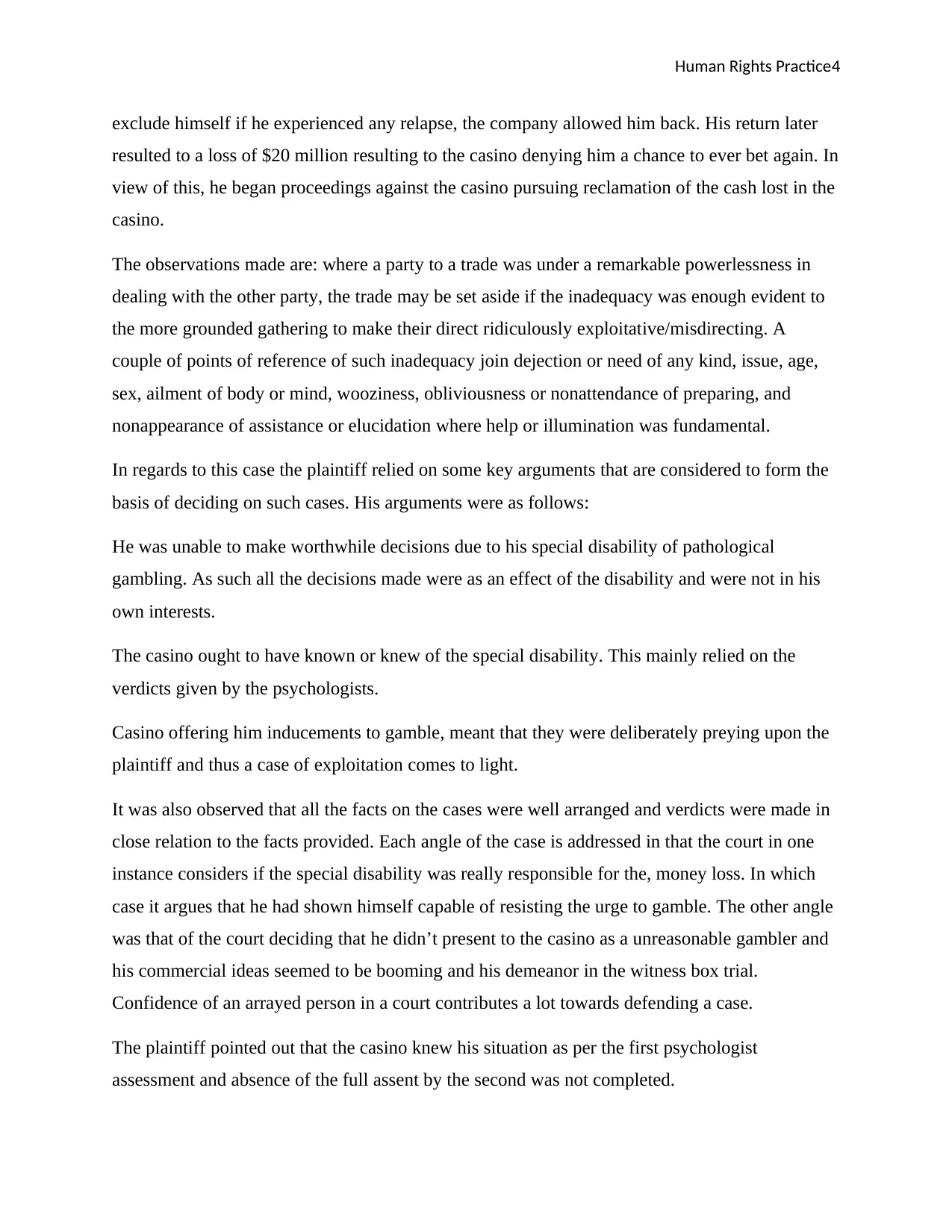
Human Rights Practice4
exclude himself if he experienced any relapse, the company allowed him back. His return later
resulted to a loss of $20 million resulting to the casino denying him a chance to ever bet again. In
view of this, he began proceedings against the casino pursuing reclamation of the cash lost in the
casino.
The observations made are: where a party to a trade was under a remarkable powerlessness in
dealing with the other party, the trade may be set aside if the inadequacy was enough evident to
the more grounded gathering to make their direct ridiculously exploitative/misdirecting. A
couple of points of reference of such inadequacy join dejection or need of any kind, issue, age,
sex, ailment of body or mind, wooziness, obliviousness or nonattendance of preparing, and
nonappearance of assistance or elucidation where help or illumination was fundamental.
In regards to this case the plaintiff relied on some key arguments that are considered to form the
basis of deciding on such cases. His arguments were as follows:
He was unable to make worthwhile decisions due to his special disability of pathological
gambling. As such all the decisions made were as an effect of the disability and were not in his
own interests.
The casino ought to have known or knew of the special disability. This mainly relied on the
verdicts given by the psychologists.
Casino offering him inducements to gamble, meant that they were deliberately preying upon the
plaintiff and thus a case of exploitation comes to light.
It was also observed that all the facts on the cases were well arranged and verdicts were made in
close relation to the facts provided. Each angle of the case is addressed in that the court in one
instance considers if the special disability was really responsible for the, money loss. In which
case it argues that he had shown himself capable of resisting the urge to gamble. The other angle
was that of the court deciding that he didn’t present to the casino as a unreasonable gambler and
his commercial ideas seemed to be booming and his demeanor in the witness box trial.
Confidence of an arrayed person in a court contributes a lot towards defending a case.
The plaintiff pointed out that the casino knew his situation as per the first psychologist
assessment and absence of the full assent by the second was not completed.
exclude himself if he experienced any relapse, the company allowed him back. His return later
resulted to a loss of $20 million resulting to the casino denying him a chance to ever bet again. In
view of this, he began proceedings against the casino pursuing reclamation of the cash lost in the
casino.
The observations made are: where a party to a trade was under a remarkable powerlessness in
dealing with the other party, the trade may be set aside if the inadequacy was enough evident to
the more grounded gathering to make their direct ridiculously exploitative/misdirecting. A
couple of points of reference of such inadequacy join dejection or need of any kind, issue, age,
sex, ailment of body or mind, wooziness, obliviousness or nonattendance of preparing, and
nonappearance of assistance or elucidation where help or illumination was fundamental.
In regards to this case the plaintiff relied on some key arguments that are considered to form the
basis of deciding on such cases. His arguments were as follows:
He was unable to make worthwhile decisions due to his special disability of pathological
gambling. As such all the decisions made were as an effect of the disability and were not in his
own interests.
The casino ought to have known or knew of the special disability. This mainly relied on the
verdicts given by the psychologists.
Casino offering him inducements to gamble, meant that they were deliberately preying upon the
plaintiff and thus a case of exploitation comes to light.
It was also observed that all the facts on the cases were well arranged and verdicts were made in
close relation to the facts provided. Each angle of the case is addressed in that the court in one
instance considers if the special disability was really responsible for the, money loss. In which
case it argues that he had shown himself capable of resisting the urge to gamble. The other angle
was that of the court deciding that he didn’t present to the casino as a unreasonable gambler and
his commercial ideas seemed to be booming and his demeanor in the witness box trial.
Confidence of an arrayed person in a court contributes a lot towards defending a case.
The plaintiff pointed out that the casino knew his situation as per the first psychologist
assessment and absence of the full assent by the second was not completed.
Paraphrase This Document
Need a fresh take? Get an instant paraphrase of this document with our AI Paraphraser
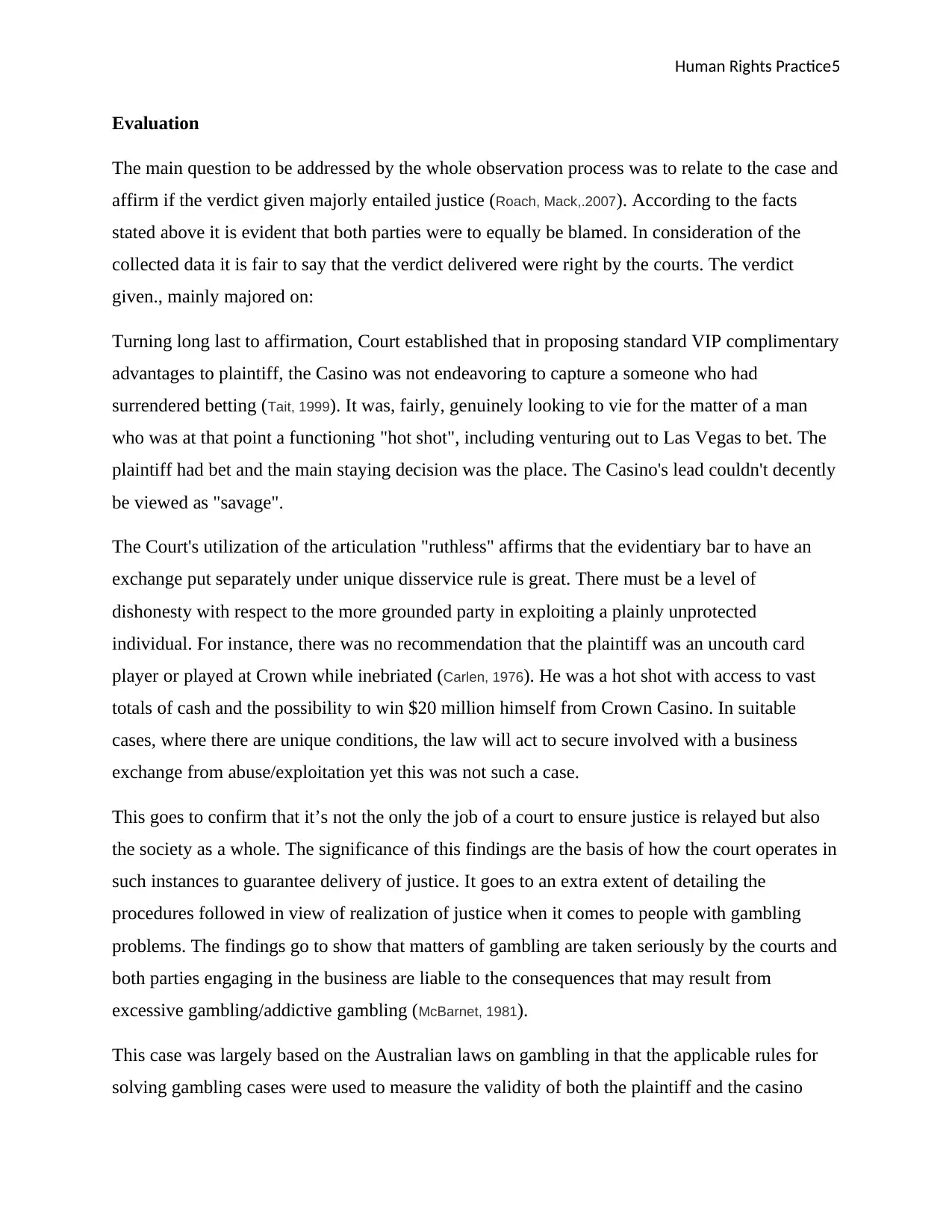
Human Rights Practice5
Evaluation
The main question to be addressed by the whole observation process was to relate to the case and
affirm if the verdict given majorly entailed justice (Roach, Mack,.2007). According to the facts
stated above it is evident that both parties were to equally be blamed. In consideration of the
collected data it is fair to say that the verdict delivered were right by the courts. The verdict
given., mainly majored on:
Turning long last to affirmation, Court established that in proposing standard VIP complimentary
advantages to plaintiff, the Casino was not endeavoring to capture a someone who had
surrendered betting (Tait, 1999). It was, fairly, genuinely looking to vie for the matter of a man
who was at that point a functioning "hot shot", including venturing out to Las Vegas to bet. The
plaintiff had bet and the main staying decision was the place. The Casino's lead couldn't decently
be viewed as "savage".
The Court's utilization of the articulation "ruthless" affirms that the evidentiary bar to have an
exchange put separately under unique disservice rule is great. There must be a level of
dishonesty with respect to the more grounded party in exploiting a plainly unprotected
individual. For instance, there was no recommendation that the plaintiff was an uncouth card
player or played at Crown while inebriated (Carlen, 1976). He was a hot shot with access to vast
totals of cash and the possibility to win $20 million himself from Crown Casino. In suitable
cases, where there are unique conditions, the law will act to secure involved with a business
exchange from abuse/exploitation yet this was not such a case.
This goes to confirm that it’s not the only the job of a court to ensure justice is relayed but also
the society as a whole. The significance of this findings are the basis of how the court operates in
such instances to guarantee delivery of justice. It goes to an extra extent of detailing the
procedures followed in view of realization of justice when it comes to people with gambling
problems. The findings go to show that matters of gambling are taken seriously by the courts and
both parties engaging in the business are liable to the consequences that may result from
excessive gambling/addictive gambling (McBarnet, 1981).
This case was largely based on the Australian laws on gambling in that the applicable rules for
solving gambling cases were used to measure the validity of both the plaintiff and the casino
Evaluation
The main question to be addressed by the whole observation process was to relate to the case and
affirm if the verdict given majorly entailed justice (Roach, Mack,.2007). According to the facts
stated above it is evident that both parties were to equally be blamed. In consideration of the
collected data it is fair to say that the verdict delivered were right by the courts. The verdict
given., mainly majored on:
Turning long last to affirmation, Court established that in proposing standard VIP complimentary
advantages to plaintiff, the Casino was not endeavoring to capture a someone who had
surrendered betting (Tait, 1999). It was, fairly, genuinely looking to vie for the matter of a man
who was at that point a functioning "hot shot", including venturing out to Las Vegas to bet. The
plaintiff had bet and the main staying decision was the place. The Casino's lead couldn't decently
be viewed as "savage".
The Court's utilization of the articulation "ruthless" affirms that the evidentiary bar to have an
exchange put separately under unique disservice rule is great. There must be a level of
dishonesty with respect to the more grounded party in exploiting a plainly unprotected
individual. For instance, there was no recommendation that the plaintiff was an uncouth card
player or played at Crown while inebriated (Carlen, 1976). He was a hot shot with access to vast
totals of cash and the possibility to win $20 million himself from Crown Casino. In suitable
cases, where there are unique conditions, the law will act to secure involved with a business
exchange from abuse/exploitation yet this was not such a case.
This goes to confirm that it’s not the only the job of a court to ensure justice is relayed but also
the society as a whole. The significance of this findings are the basis of how the court operates in
such instances to guarantee delivery of justice. It goes to an extra extent of detailing the
procedures followed in view of realization of justice when it comes to people with gambling
problems. The findings go to show that matters of gambling are taken seriously by the courts and
both parties engaging in the business are liable to the consequences that may result from
excessive gambling/addictive gambling (McBarnet, 1981).
This case was largely based on the Australian laws on gambling in that the applicable rules for
solving gambling cases were used to measure the validity of both the plaintiff and the casino
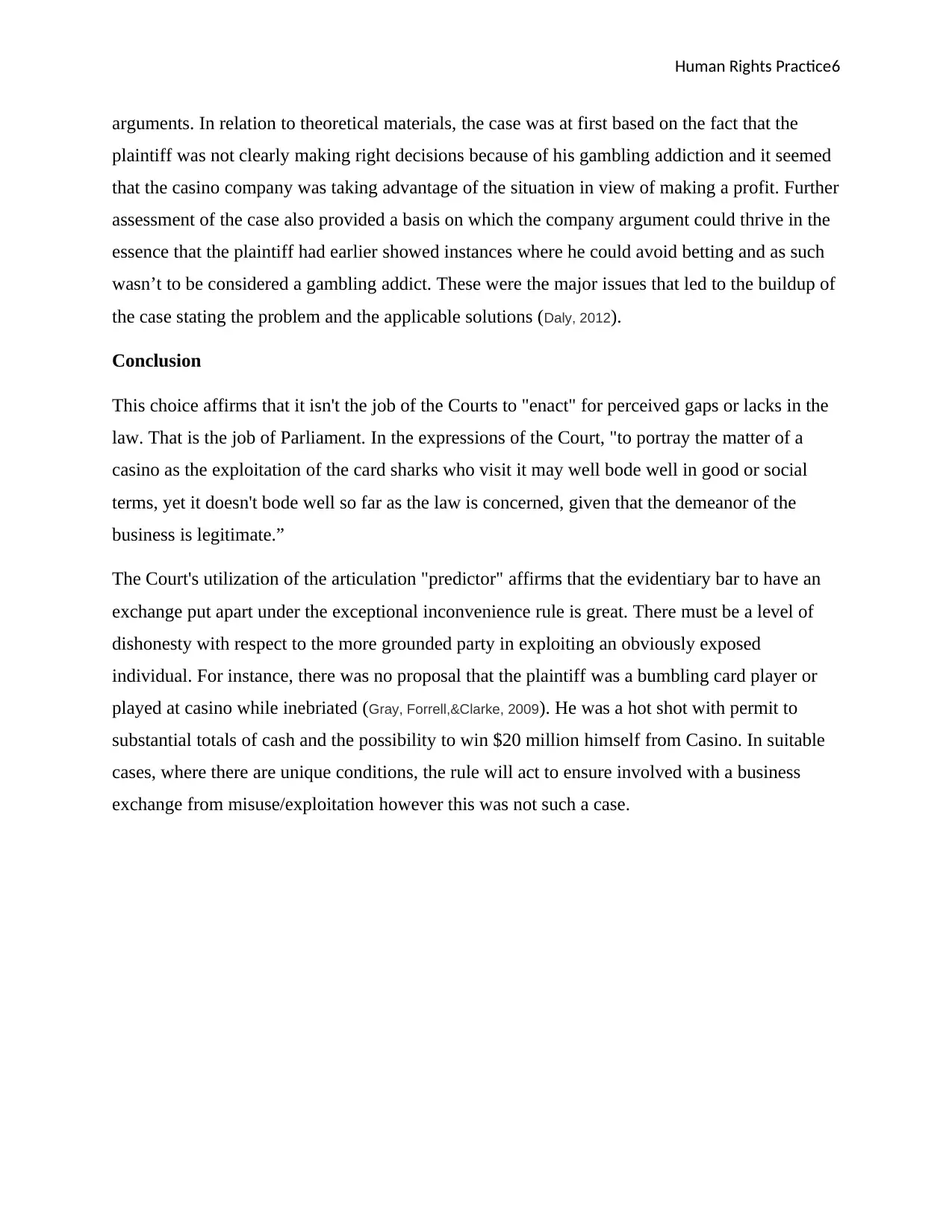
Human Rights Practice6
arguments. In relation to theoretical materials, the case was at first based on the fact that the
plaintiff was not clearly making right decisions because of his gambling addiction and it seemed
that the casino company was taking advantage of the situation in view of making a profit. Further
assessment of the case also provided a basis on which the company argument could thrive in the
essence that the plaintiff had earlier showed instances where he could avoid betting and as such
wasn’t to be considered a gambling addict. These were the major issues that led to the buildup of
the case stating the problem and the applicable solutions (Daly, 2012).
Conclusion
This choice affirms that it isn't the job of the Courts to "enact" for perceived gaps or lacks in the
law. That is the job of Parliament. In the expressions of the Court, "to portray the matter of a
casino as the exploitation of the card sharks who visit it may well bode well in good or social
terms, yet it doesn't bode well so far as the law is concerned, given that the demeanor of the
business is legitimate.”
The Court's utilization of the articulation "predictor" affirms that the evidentiary bar to have an
exchange put apart under the exceptional inconvenience rule is great. There must be a level of
dishonesty with respect to the more grounded party in exploiting an obviously exposed
individual. For instance, there was no proposal that the plaintiff was a bumbling card player or
played at casino while inebriated (Gray, Forrell,&Clarke, 2009). He was a hot shot with permit to
substantial totals of cash and the possibility to win $20 million himself from Casino. In suitable
cases, where there are unique conditions, the rule will act to ensure involved with a business
exchange from misuse/exploitation however this was not such a case.
arguments. In relation to theoretical materials, the case was at first based on the fact that the
plaintiff was not clearly making right decisions because of his gambling addiction and it seemed
that the casino company was taking advantage of the situation in view of making a profit. Further
assessment of the case also provided a basis on which the company argument could thrive in the
essence that the plaintiff had earlier showed instances where he could avoid betting and as such
wasn’t to be considered a gambling addict. These were the major issues that led to the buildup of
the case stating the problem and the applicable solutions (Daly, 2012).
Conclusion
This choice affirms that it isn't the job of the Courts to "enact" for perceived gaps or lacks in the
law. That is the job of Parliament. In the expressions of the Court, "to portray the matter of a
casino as the exploitation of the card sharks who visit it may well bode well in good or social
terms, yet it doesn't bode well so far as the law is concerned, given that the demeanor of the
business is legitimate.”
The Court's utilization of the articulation "predictor" affirms that the evidentiary bar to have an
exchange put apart under the exceptional inconvenience rule is great. There must be a level of
dishonesty with respect to the more grounded party in exploiting an obviously exposed
individual. For instance, there was no proposal that the plaintiff was a bumbling card player or
played at casino while inebriated (Gray, Forrell,&Clarke, 2009). He was a hot shot with permit to
substantial totals of cash and the possibility to win $20 million himself from Casino. In suitable
cases, where there are unique conditions, the rule will act to ensure involved with a business
exchange from misuse/exploitation however this was not such a case.
⊘ This is a preview!⊘
Do you want full access?
Subscribe today to unlock all pages.

Trusted by 1+ million students worldwide
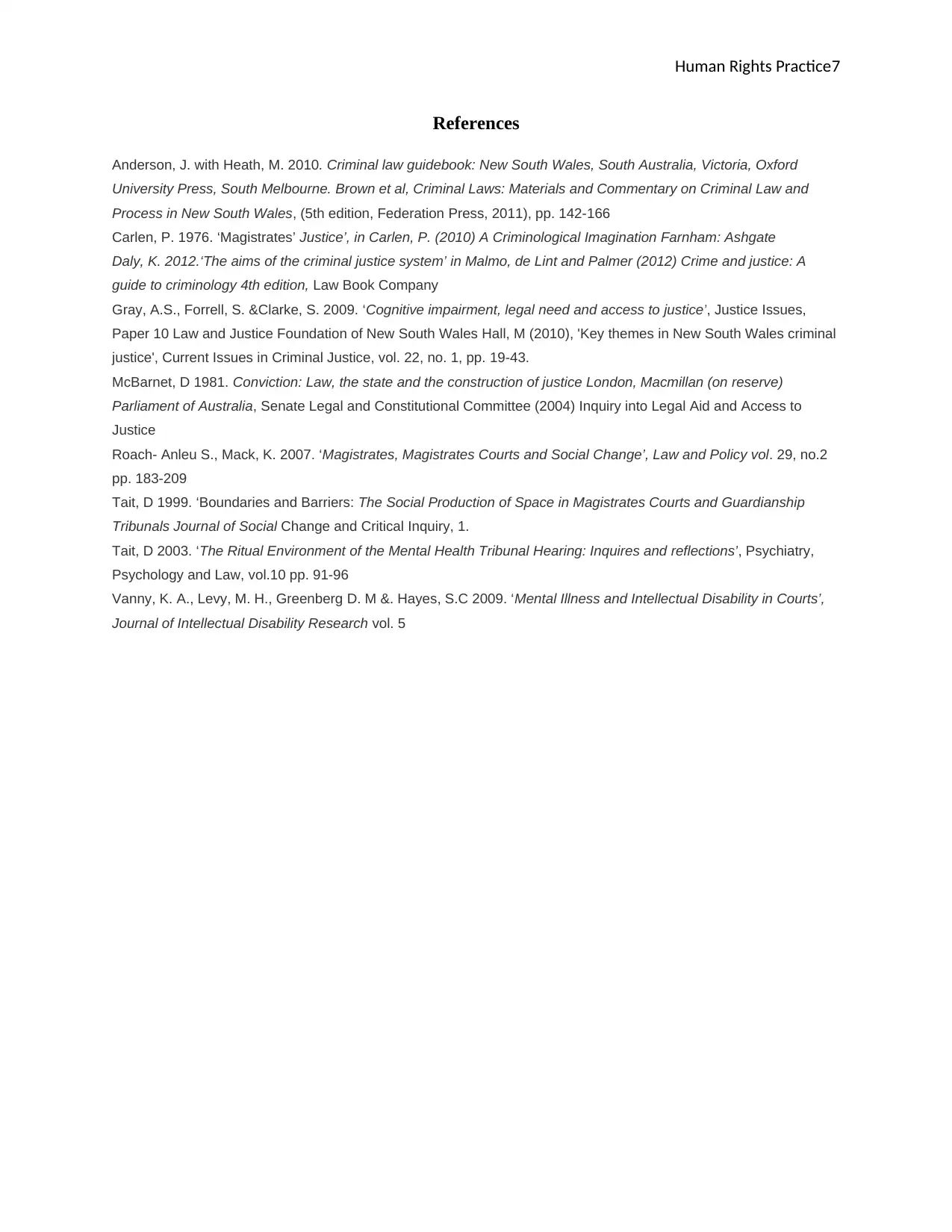
Human Rights Practice7
References
Anderson, J. with Heath, M. 2010. Criminal law guidebook: New South Wales, South Australia, Victoria, Oxford
University Press, South Melbourne. Brown et al, Criminal Laws: Materials and Commentary on Criminal Law and
Process in New South Wales, (5th edition, Federation Press, 2011), pp. 142-166
Carlen, P. 1976. ‘Magistrates’ Justice’, in Carlen, P. (2010) A Criminological Imagination Farnham: Ashgate
Daly, K. 2012.‘The aims of the criminal justice system’ in Malmo, de Lint and Palmer (2012) Crime and justice: A
guide to criminology 4th edition, Law Book Company
Gray, A.S., Forrell, S. &Clarke, S. 2009. ‘Cognitive impairment, legal need and access to justice’, Justice Issues,
Paper 10 Law and Justice Foundation of New South Wales Hall, M (2010), 'Key themes in New South Wales criminal
justice', Current Issues in Criminal Justice, vol. 22, no. 1, pp. 19-43.
McBarnet, D 1981. Conviction: Law, the state and the construction of justice London, Macmillan (on reserve)
Parliament of Australia, Senate Legal and Constitutional Committee (2004) Inquiry into Legal Aid and Access to
Justice
Roach- Anleu S., Mack, K. 2007. ‘Magistrates, Magistrates Courts and Social Change’, Law and Policy vol. 29, no.2
pp. 183-209
Tait, D 1999. ‘Boundaries and Barriers: The Social Production of Space in Magistrates Courts and Guardianship
Tribunals Journal of Social Change and Critical Inquiry, 1.
Tait, D 2003. ‘The Ritual Environment of the Mental Health Tribunal Hearing: Inquires and reflections’, Psychiatry,
Psychology and Law, vol.10 pp. 91-96
Vanny, K. A., Levy, M. H., Greenberg D. M &. Hayes, S.C 2009. ‘Mental Illness and Intellectual Disability in Courts’,
Journal of Intellectual Disability Research vol. 5
References
Anderson, J. with Heath, M. 2010. Criminal law guidebook: New South Wales, South Australia, Victoria, Oxford
University Press, South Melbourne. Brown et al, Criminal Laws: Materials and Commentary on Criminal Law and
Process in New South Wales, (5th edition, Federation Press, 2011), pp. 142-166
Carlen, P. 1976. ‘Magistrates’ Justice’, in Carlen, P. (2010) A Criminological Imagination Farnham: Ashgate
Daly, K. 2012.‘The aims of the criminal justice system’ in Malmo, de Lint and Palmer (2012) Crime and justice: A
guide to criminology 4th edition, Law Book Company
Gray, A.S., Forrell, S. &Clarke, S. 2009. ‘Cognitive impairment, legal need and access to justice’, Justice Issues,
Paper 10 Law and Justice Foundation of New South Wales Hall, M (2010), 'Key themes in New South Wales criminal
justice', Current Issues in Criminal Justice, vol. 22, no. 1, pp. 19-43.
McBarnet, D 1981. Conviction: Law, the state and the construction of justice London, Macmillan (on reserve)
Parliament of Australia, Senate Legal and Constitutional Committee (2004) Inquiry into Legal Aid and Access to
Justice
Roach- Anleu S., Mack, K. 2007. ‘Magistrates, Magistrates Courts and Social Change’, Law and Policy vol. 29, no.2
pp. 183-209
Tait, D 1999. ‘Boundaries and Barriers: The Social Production of Space in Magistrates Courts and Guardianship
Tribunals Journal of Social Change and Critical Inquiry, 1.
Tait, D 2003. ‘The Ritual Environment of the Mental Health Tribunal Hearing: Inquires and reflections’, Psychiatry,
Psychology and Law, vol.10 pp. 91-96
Vanny, K. A., Levy, M. H., Greenberg D. M &. Hayes, S.C 2009. ‘Mental Illness and Intellectual Disability in Courts’,
Journal of Intellectual Disability Research vol. 5
1 out of 7
Your All-in-One AI-Powered Toolkit for Academic Success.
+13062052269
info@desklib.com
Available 24*7 on WhatsApp / Email
![[object Object]](/_next/static/media/star-bottom.7253800d.svg)
Unlock your academic potential
Copyright © 2020–2026 A2Z Services. All Rights Reserved. Developed and managed by ZUCOL.

